Auctions
Exquisite Pieces Shatter Estimates, Attract New Buyers at Phillips London Design Auction
In a sale of topnotch design, pieces by Peder Moos, Andre Dubreuil, and Elizabeth Garouste and Mattia Bonetti soared past estimates. Surprisingly, a Les Lalannes fountain runneth dry.
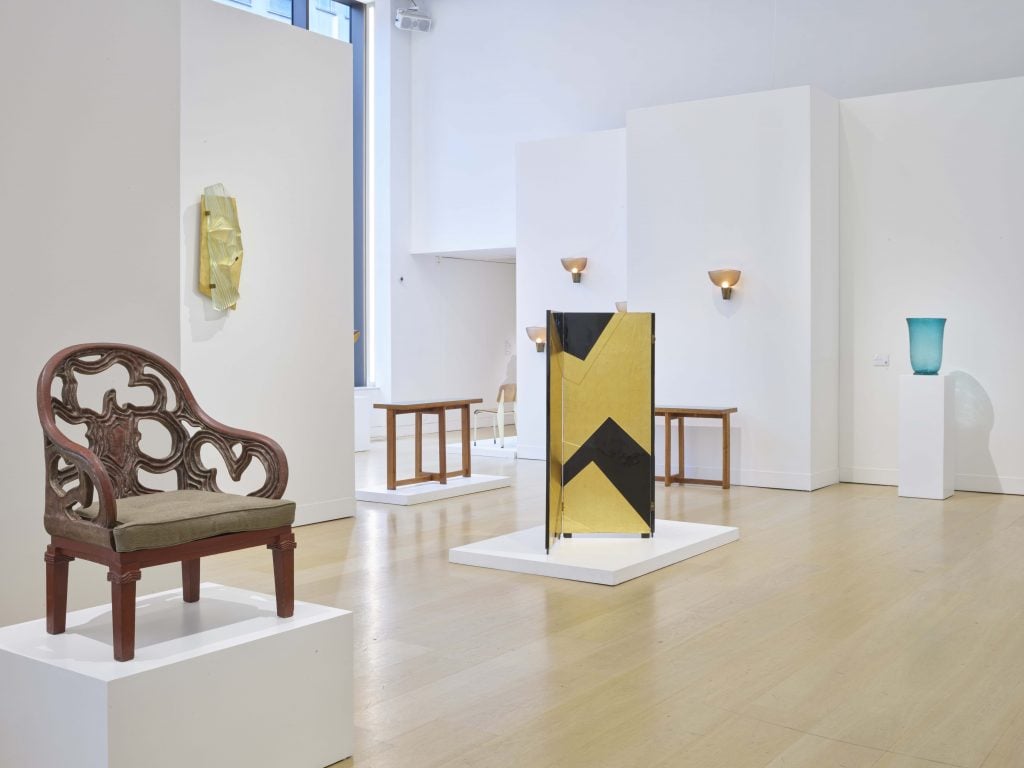
At Phillips auction house in London yesterday afternoon, a chair designed around 1915 by Seizo Sugawara went under the hammer at £195,000 (£247,650 or $315,580 including fees). The chair, in carved and lacquered wood, had been spotted by an eagle-eyed collector in a small auction house in Enghien-Les-Bains, a northern suburb of Paris. At the time the auction house and previous owner had not recognized the chair as being designed by Sugawara and the estimate was €200-300. In that auction it sold for nearly €200,000. Its style, uniting Belle Epoque fluidity with Japanese lacquer, makes it emblematic of an era when the French avant-garde fell in love with this sort of East Asian fusion.
Sugawara, apart from being a master craftsman in his own right, is closely linked to the French designer Eileen Gray. He taught her the art of lacquer, and she campaigned for his naturalization as a French citizen.
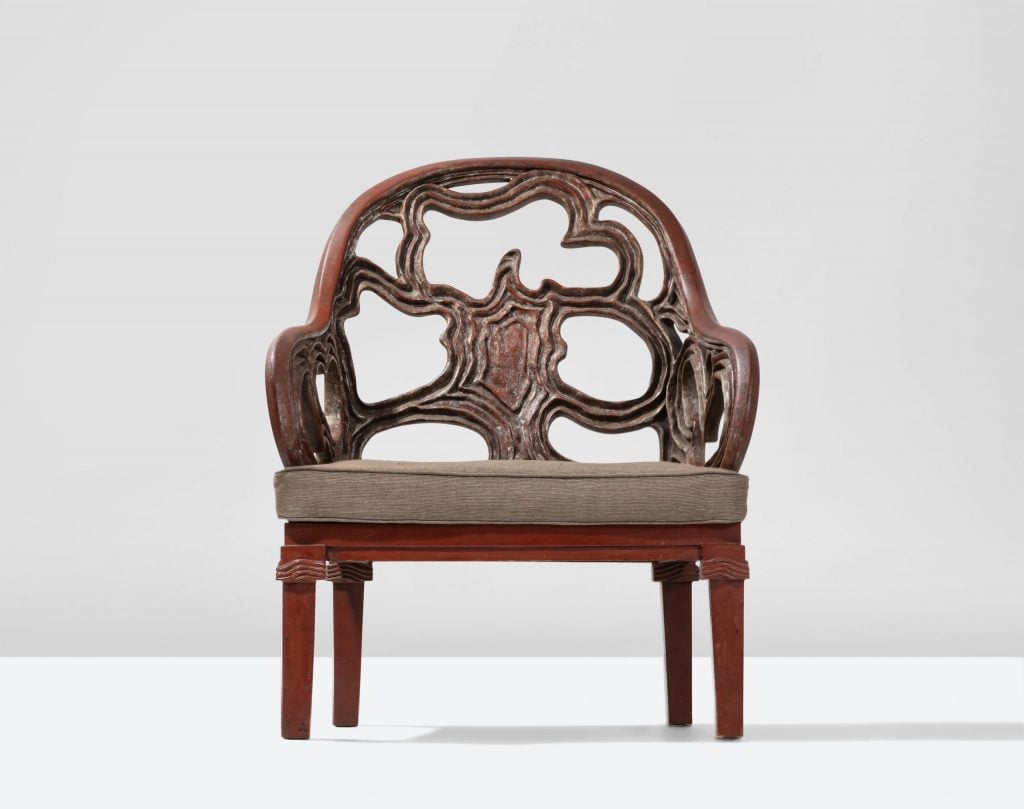
Seizô Sugawara, Rare armchair (circa 1915). Likely carved by cabinetmaker Kichizô Inagaki, Paris, France. Courtesy of Phillips.
This wasn’t the only story being told at the Design sale, which was composed mostly of French and Italian works from the 20th century. As the afternoon progressed, it was noticeable that the decorative arts are back in fashion. Vendors take note!
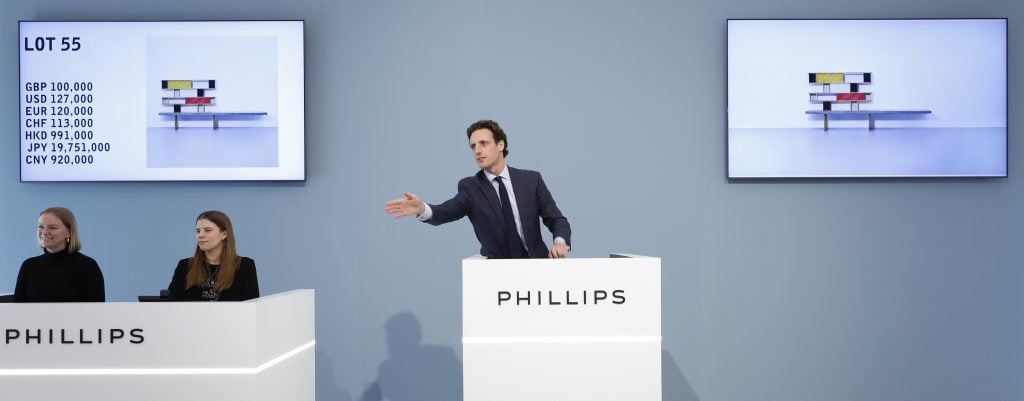
The sale room at Phillips London for ‘Design’ on November 13. Courtesy of Phillips.
A pair of fire irons in cast iron and bronze by Elizabeth Garouste and Mattia Bonetti, made in 1994, sold for £76,200 ($97,006), against an estimate of £5000–£7000. A little later, a pair of “Perles” candleholders by the late Andre Dubreuil, in patinated and gilded iron hung and with glass drops, went all the way to £152,400 ($194,012, inc fees). The estimate? £18,000–£24,000.
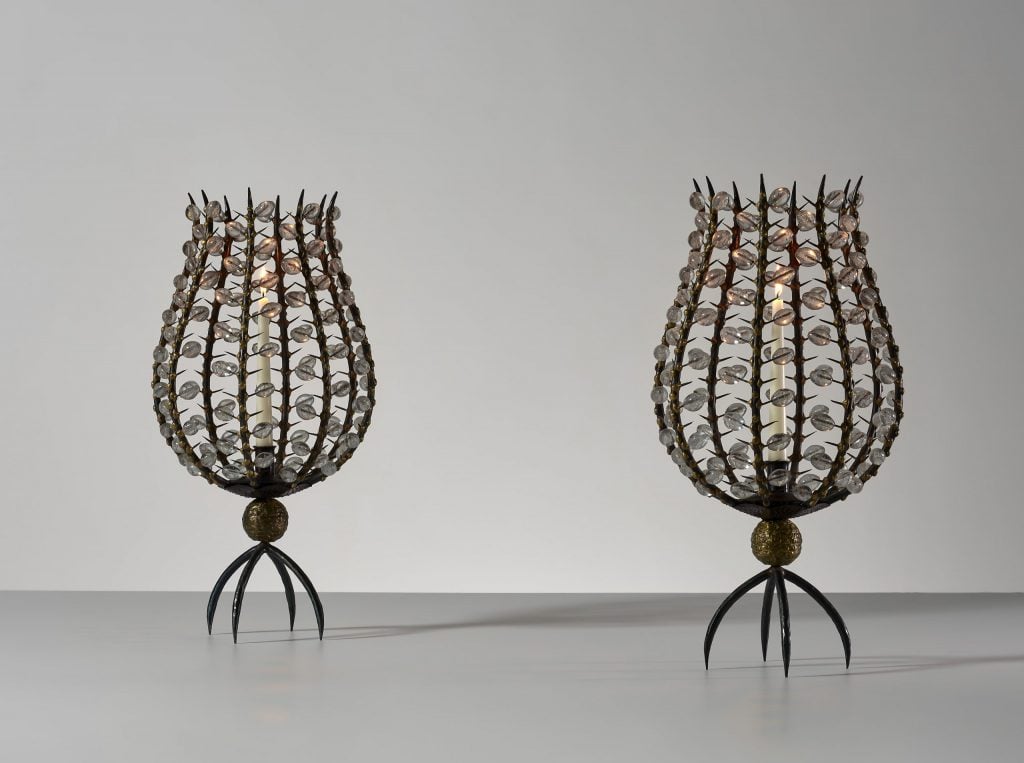
André Dubreuil, Pair of ‘Perles’ candleholders (circa 1990s). Patinated and gilded iron, glass. Produced by A.D. Decorative Arts Ltd., France. Courtesy of Phillips.
A tottering Martin Szekely vase, called Nord and made by Belgian specialists Val de Lambert in molded and cut crystal, jumped from a £4,000–£6,000 estimate to a £38,100 ($48,503) sale price. A Peder Moos rosewood candlestand £40,000 ($50,922) on the hammer (£5,000–£7,000 estimate).
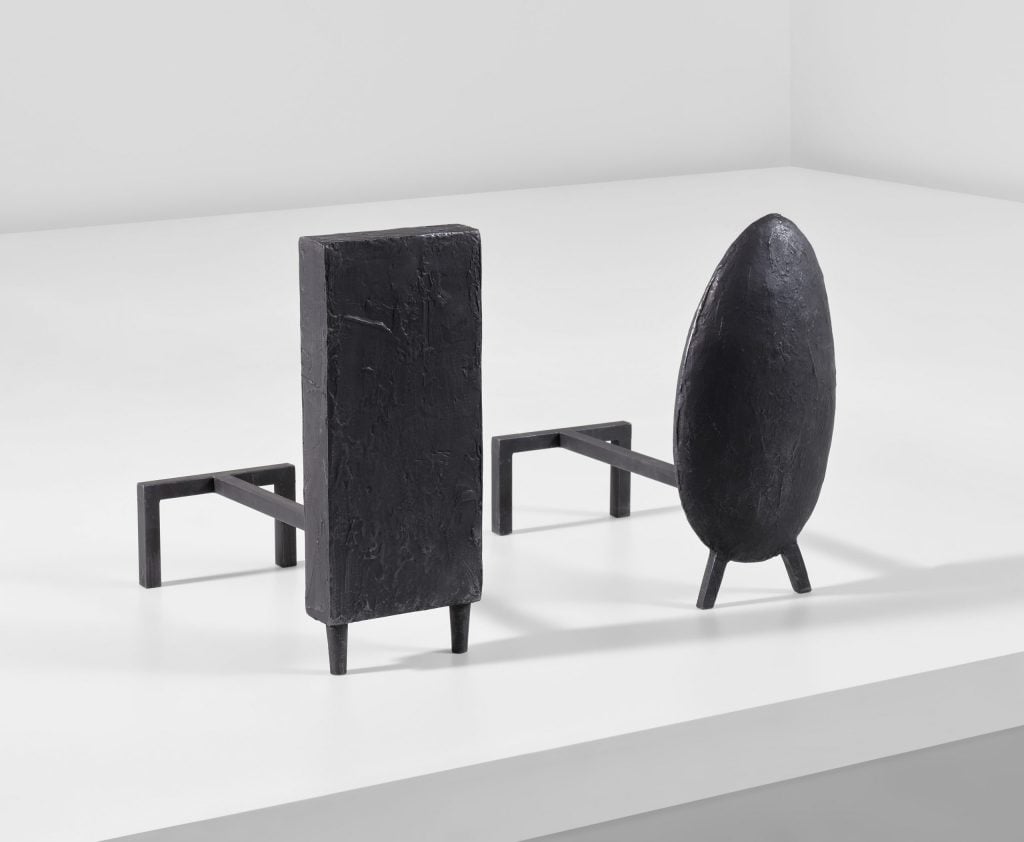
Elizabeth Garouste and Mattia Bonetti, Pair of ‘Abstract’ andirons (circa 1994). Patinated bronze, patinated steel. Produced by David Gill, London, United Kingdom. Courtesy of Phillips.
By way of balance, the other desirable works were more architecturally aligned. Rare works by Carlo Scarpa, the early 20th Century Venetian who revered craft and a certain rationalist rigor, are now desperately sought after. Bidders fought hard for a chandelier, console tables, and an exquisite pair of dainty chairs among other lots. A finely detailed oak veneer desk, designed in 1934 by Eugene Printz (estimate £25,000–35,000), sold at £114,300 ($145,509).
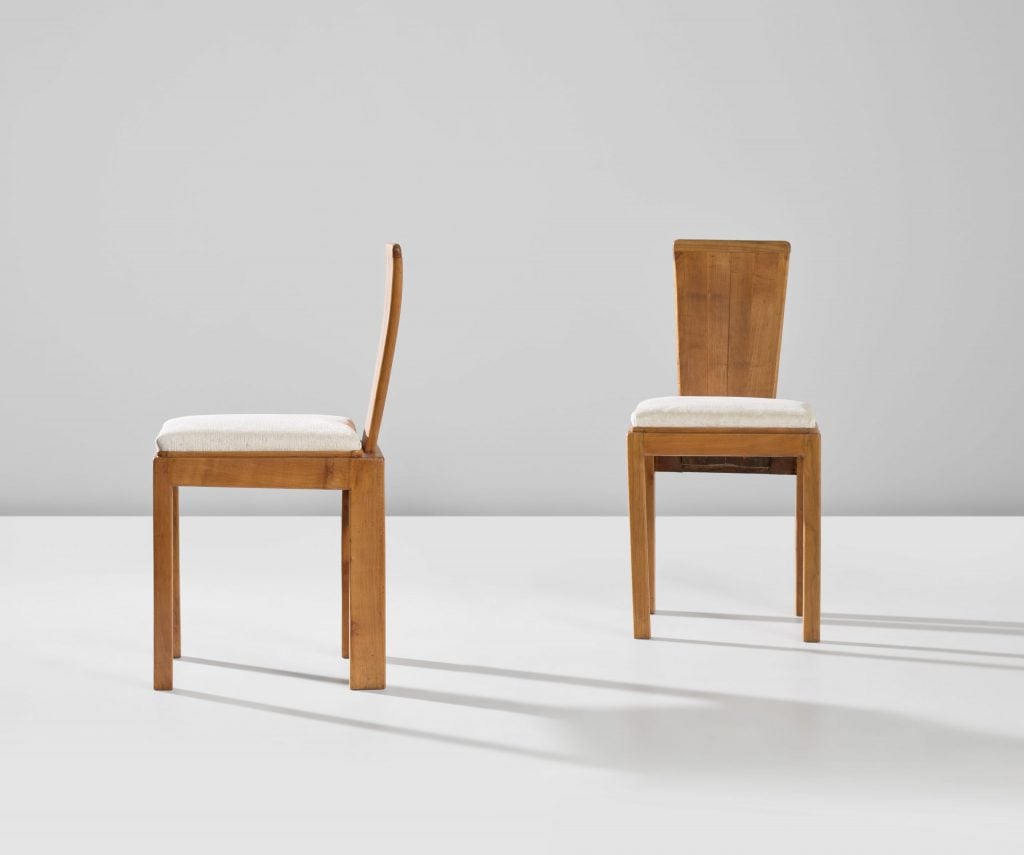
Carlo Scarpa, Pair of rare chairs (1935–1937). Courtesy of Phillips.
Before the sale, Domenico Raimondo, Phillips Head of Department, Design Europe and International Specialist, remarked that: “In spite of Brexit-induced issues around import and export, London has to keep promoting design. It’s a key place for design education, with the best colleges in the world, and offers a major cross-over when it comes to clients.” Indeed, there were plenty of phone deals from the US and Asia on the day.
With a wide mix of design styles on show, Raimondo also hoped to bring energy and new clients to the sector. Everything from the famous Memphis school of 1980s Milan to a folksy suite of Sicilian works—all gaily painted wood and woven seats—made in the late 1800s by Ernesto Basile appeared in the curated collection which spread over the three exhibition floors of Phillips Berkeley Square building.
In the pre-sale week, it was attracting a number of younger collectors in expensive sweaters and baseball caps though well-heeled women of a certain age were also much in evidence. “The interior decorators and designers are now very powerful in this area,” added Raimondo.
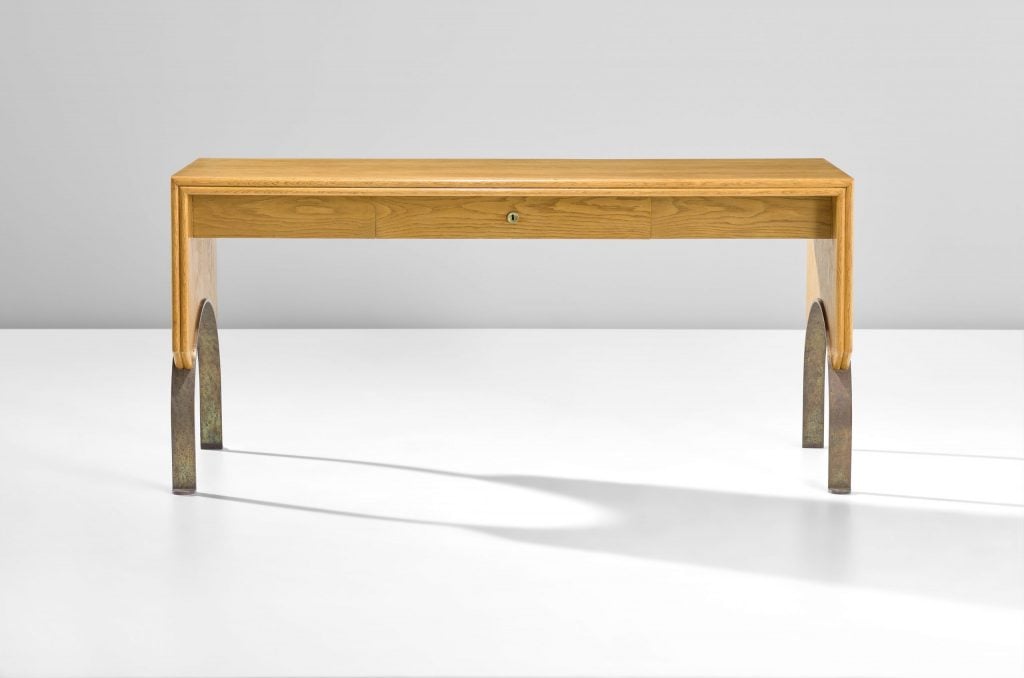
Eugène Printz, Desk (circa 1934). Oak, oak-veneered wood, patinated steel. Courtesy of Philips.
Of course, the jeopardy of the auction system doesn’t come without the odd stumble.
In this case it was a flamboyant fountain by the Lalannes called Fontaine Pleureuse. The Surrealist ivy-covered piece, its supine head an homage to Brancusi, failed to reach its estimate of £200,000–£300,000. While certain Lalannes works can now go into the millions, this melancholy outdoor work failed to get the bidders going. (One expert commented that perhaps the estimate would have been more realistic in euros.) It was, perhaps, the wrong time and the wrong place.





